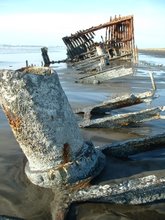Polarizing Effect
I remember playing with polarizing filters in Science class in High School. I thought is was cool how they darkened the sky or removed reflections depending on which way you turned the filter (to allow only certain light waves to pass through).
Since then, whenever I played around with photography, I always wished I had a polarizing filter.
Well, my wish came true this Christmas, and now that the snow, ice, rain, wind and cloudy skies finally took a break, I had the opportunity to experiment a little bit with it.
 This is "without" the polarizing filter (actually the filter was on the camera, just not turned to only allow the rich colors to come through).
This is "without" the polarizing filter (actually the filter was on the camera, just not turned to only allow the rich colors to come through).  This is with the polarizing filter. It really brings out the dark blue sky.
This is with the polarizing filter. It really brings out the dark blue sky. Without. Notice how yellow the tree needles are--probably from all of the random light rays reflecting off of them.
Without. Notice how yellow the tree needles are--probably from all of the random light rays reflecting off of them.Although our camera has Auto adjustment features, I like to use the manual settings to help me learn how to control the picture. I learned that the polarizing filter darkens the subject so you have to adjust the speed or aperture to compensate. Our camera has a built-in light meter to help indicate when adjustments need to be made.
 This demonstrates how the polarizing filter can reduce reflections. Notice the solid colors of the creek. Without the polarizing filter, the water would have a whitish haze, particularly over the top right corner of the photo, as it reflects the sky.
This demonstrates how the polarizing filter can reduce reflections. Notice the solid colors of the creek. Without the polarizing filter, the water would have a whitish haze, particularly over the top right corner of the photo, as it reflects the sky.A polarizing filter is a nice little tool to make colors rich and reduce unwanted reflections.



1 comment:
Before I gave all my camera gear to my (now ex) sister-in-law ... because she lived in Alaska and wanted to get involved in photography ... I had a dozen or so filters for the camera.
My favorite use of them was to create photos of "alien" beaches. Like a green sun setting over a red sea.
Unfortunately, my book of them got "misplaced" in a move. Now all I have are the mental images of them.
Post a Comment